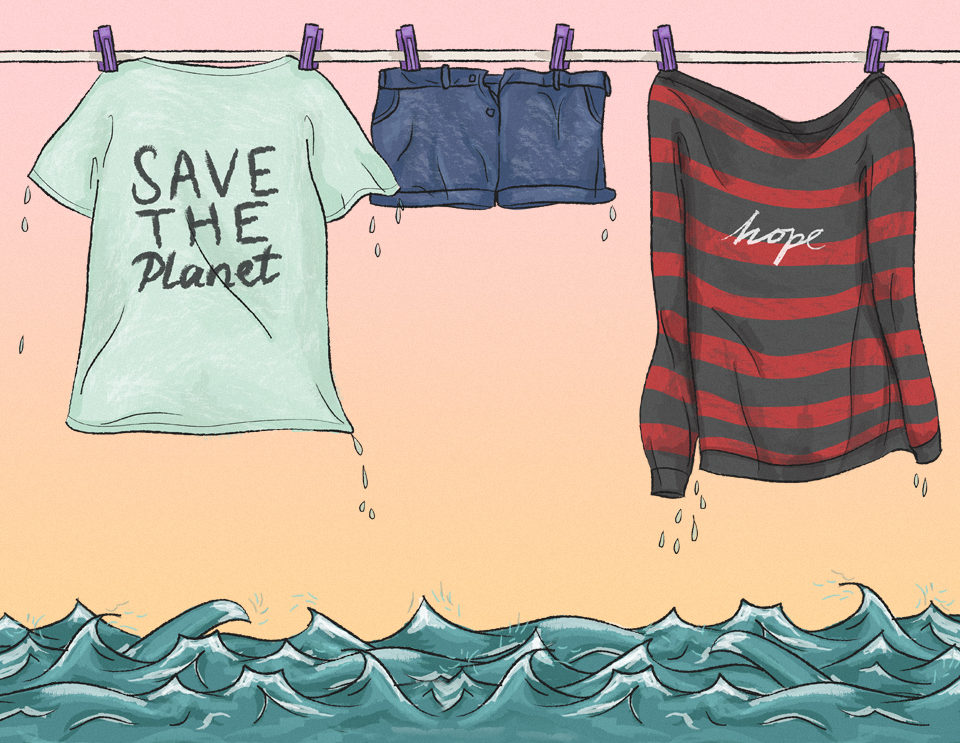Fashion Revolution Week is in its 5th year, raising awareness for issues within the fashion industry and creating change. The campaign falls on the week of the Rana Plaza garment factory collapse which occurred in 2013 causing over 1,000 easily preventable deaths. Learn more about how to take part, here.
Fashion Revolution Week kicks off in a weeks time so as a quick reminder as to what the week is all about and ways that you can get involved, I thought I would compile a list of facts and figures that will refresh your ethical fashion knowledge! Or, not so ethical fashion knowledge, as you’ll soon see…
1. Only 20% of global textiles are recycled…
The other 80% of are either incinerated (releasing harmful chemicals into the atmosphere) or sent to landfill, to break down and release those same harmful chemicals and toxins, into the earth. That’s an extraordinary amount of harmful waste. (via Worn Again)
Clothing waste is, of course, a huge part of that. Out of collected clothing (from recycling banks, or the like), the majority is either resold (click here for why that might not be as good as it sounds) or it’s downcycled to create products like rags or stuffing for furniture. This continues the lifecycle of fabrics but it still creates yet another inevitably disposable item which will most likely end up once again, in a landfill.
2. Most of us only regularly wear 40% of our clothes…
According to Oxfam, not only do we leave 60% of our clothes hanging in our wardrobe, we also only wear an average of 16 items once. Of course, this isn’t the most daunting statistic, however, it does shine a light on our consumption habits.
On a similar note, I wrote a piece on whether having fewer clothes makes your wardrobe more sustainable, and why a sustainable wardrobe has a lot more to do with how you dispose and care for your clothes than you think.
3. Dyeing textiles is the cause of 20% of water pollution…
Changing Market’s Dirty Fashion report revealed this statistic, and it is known that denim production is one of the worst offenders. I would highly recommend watching the documentary, River Blue, for more on this subject, including some positive innovations which are being put in place to reduce the fashion industry’s impact on the world’s water systems.
![]()
4. £1.37 is the price of a living wage…
A £25.32 priced t-shirt would increase to just £26.69 if the garment workers producing it were to be paid a living wage. This is a miniscule increase, one of which the average consumer wouldn’t bat an eyelid to.
This fact and figure was taken from Fashion Revolution’s first fanzine, however, if you want a more in-depth look into garment worker wages, the best place to look is their Garment Worker Diaries report, which breaks down wages and living conditions across eastern Asia.
5. Your gym gear could take 200 years to decompose…
Another Fashion Revolution fanzine fact – A Lycra two-piece designed for sportswear could take anywhere from 20 to 200 years to decompose and break down in a landfill, compared to natural fabrics which can take only weeks.
Fabrics are important to consider whenever you’re shopping, whether it’s second-hand or new. Although it is understandable why people often opt for synthetics for durability purposes, natural fabrics will generally always be the better option whether it’s for the planet or for your body.
Did you learn something new? What’s a fact I might not know? Let me know in the comments!
Don’t forget that you can share your support for Fashion Revolution by using my collection of GIF stickers on Instagram Story! Want to know how to use them? Click here!









5 Comments
thanks
Great post Tolly! Interesting, digestible info and something that everyone can take away 🙂
Glad you thought so, Eleanor! Thank you 🙂
I’m ALWAYS learning something new from your posts. Interesting to learn all of these straight-to-the-point facts. Coincidentally, I read similar trivia in a post written by a blogger I just discovered (if you’re interested: https://www.wheredidyourstylego.com/tashs-style-journey/2018/4/13/conscious-consumerism-g3wwb).
I think it is beneficial for bloggers – any blogger, not just sustainable and ethical bloggers – to shed a little bit of light to their audience on how harmful the fashion industry is. I’m sure there are still sooo many fashion lovers out there who are clueless. Not to say I’m not still! It’s a learning process. I had virtually no knowledge of the subject until reading your blog, and now I always want to learn more. It’s still hard to swallow – I love high street fashion so much, after all – but it’s necessary. It is.
I had bought a polyester floral suit this year and only afterwards did I learn how particularly bad polyester can be to the environment, apparently it’s just like Lycra in a sense that it takes just as long to decompose? Or perhaps there are different types of polyester? It’s all still unclear to me, except I do know for a fact that polyester = not the best. Now I’m totally put off my polyester (and Lycra too now, not that I use much of it). For me personally it seems like making mistakes in shopping is a way to learn better, and to learn quickly. Ah well.
xo, Liyana | Affordorable
So glad to hear it! Thanks, Liyana.
And yes, I can see how making mistakes can point you in the right direction but I suppose it’s always good to try and avoid making them in the first place. Not that buying polyester is technically a “mistake” (I’d personally rather avoid it, specifically when buying new).
Your curiosity and interest in it all makes me sure you’re on the right path!